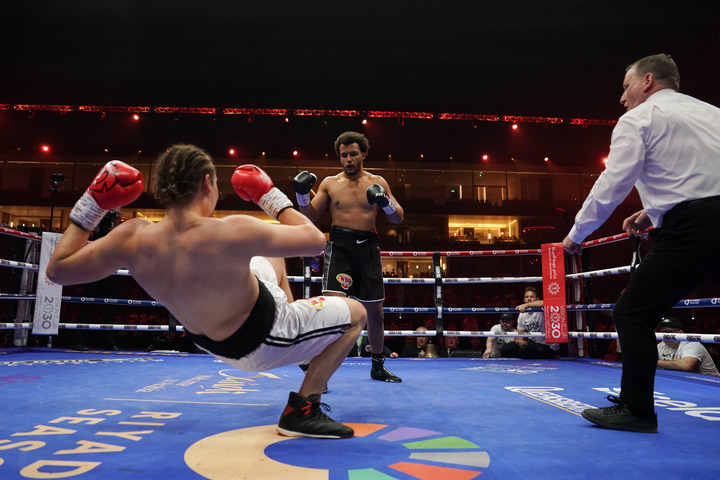Ben Davison is relishing the prospect of moulding Moses Itauma into the finest heavyweight in the world.
The 19-year-old Itauma recently recruited Davison to be his long-term trainer, and has already recorded his first victory under a figure with a growing reputation and who has already succeeded with Tyson Fury, Anthony Joshua, Fabio Wardley and more.
In his first fight under Davison, against Ilja Mezencev on the undercard of Fury-Oleksandr Usyk in Riyadh, Saudi Arabia, Itauma won inside two rounds. It was in Fury’s third fight under Davison that he transformed his career against Deontay Wilder; Joshua’s career has similarly been revived since working with the trainer for two fights after a period in which his low confidence meant that he struggled to impress.
Both fighters – two of the three finest heavyweights of the modern era – were already mature by the time they started to work with the ambitious Davison, who also previously helped Bill Haney to prepare a less developed Devin Haney for his first world-title fight, with George Kambosos Jr in 2022.
For all of his consistent success Itauma, whose victory in Riyadh was his ninth from his nine fights as a professional, is a fighter with a considerably different profile, and potentially the one with which Davison’s methods can most accurately be judged.
The trainer has already proven that he can motivate and polish proven fighters, but he is yet to lead one to the highest level having worked with them from their teenage years – and therefore had to opportunity to develop one into the vision of the fighter he believes that they can be.
“His style works with us,” said Davison, whose gym is in Harlow, Essex. “He’s a high-IQ type fighter; he’s passionate about the sport. They’re the type of fighters we like to work with. We like to work with thinking fighters; conscious fighters; smart fighters; good at setting traps. That’s exactly what he is. To get him at this point – to help him develop in those areas – is exciting.
“He should become a versatile fighter – and he is a versatile fighter – [with] lots of tricks up his sleeve, and he should have an answer for whatever his opponent wants to do. That’s what we’re working on, and that’s what he’ll end up becoming.
“He’ll be able to do a bit of everything. He’ll be able to be first; he’ll be able to counter; he’ll be able to set traps; he’ll be able to control the tempo of a fight; he’ll be able to work up close, which is important. People like Floyd Mayweather – so versatile. Talk about the Ricky Hatton fight [in 2007] – Ricky mentioned it to me before where, even inside, he felt Floyd was getting the better of him. Even inside. So that’s a well-rounded fighter – and that’s the type of fighter we want to produce, and are capable of producing.
“He’s an unbelievable talent, and a real pleasure to work with. I know sometimes he plays it down, but he’s got a real passion for the sport. He’s really motivated, and that motivates us and excites us as coaches.
“He punches plenty hard enough that the size [of the biggest heavyweights] – he’s big enough – but he punches more than hard enough for the extra big guys to make it hard for them to impose their size. He’s only 19, but he’s a phenomenal puncher – it’ll be very interesting when he gets to his physical peak to see where he is.
“A lot of heavyweights don’t peak until later on. That’s something we’ll find out along the way. It’s not a mad rush and you have to take it step by step with a young prospect.
“The more [his potential] will show is in the higher level. The opponents won’t show some areas of his game that we’ll focus on to have developed – the goal is for some of the areas that need working on right now will never show up, because by the time he gets to the point where he needs them, he’ll have them.”
Some of the world’s leading trainers recognise the key to a fighter’s development is often high-quality sparring, which in Joshua and Wardley potentially exists with two other heavyweights at Davison’s gym.
Some of the world’s leading trainers similarly also recognise how different it can be to train a heavyweight to a fighter in any other weight division, and Davison said: “You’ve got more freedom. With some of the smaller fighters making weight is always a big issue; all of these kind of things. With heavyweights you don’t have to concern yourself with those things.
“Sometimes we’ll get to a point in a session that may not be the longest session, but we’ve managed to get nailed on what we wanted to focus on that session and we can end the session there. We haven’t gotta carry on because we’ve got the focus of making weight to concern ourselves with, and that actually helps with the development.
“I like to create a team environment so I don’t have the guys sparring among themselves too often – just because they’re all big, physical, strong guys who are going to take it out of each other. So here and there they’ll help each other out, when needed, but it’s not something I encourage too much. I like to keep the team environment.
“Most of the work’s done in the gym. I will talk more in the corner in the gym than I will do on the [fight] night, because he’ll understand certain ways I’ll articulate what I want him to do – he’ll understand what I mean when I say that. I may not need to say much in the corner on the night, because I’ll say what I need to say and that’s it.
“That’s the most important point – he can focus on that.”


ADD COMMENT VIEW COMMENTS (15)